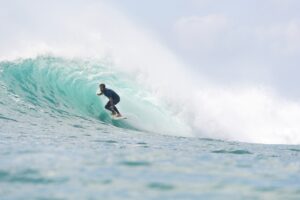5 Things to Know when you Start Surfing – Lanzasurf
 Are you interested in learning how to surf? Before you head out into the ocean, there are some essential things you should know, such as surf ethics, the necessary equipment, advice for newcomers, how to choose the right surf spot, and more.At Lanzasurf, our family of passionate surfers is devoted to helping beginners and intermediates learn to surf faster than they ever thought possible. We believe that the more you progress in surfing, the more enjoyable it becomes. We understand that there is a way to speed up the process of teaching someone to surf, and we are eager to share our insights with you. Here are the top 5 pieces of advice we think any beginner/intermediate surfer should consider when starting out.
Are you interested in learning how to surf? Before you head out into the ocean, there are some essential things you should know, such as surf ethics, the necessary equipment, advice for newcomers, how to choose the right surf spot, and more.At Lanzasurf, our family of passionate surfers is devoted to helping beginners and intermediates learn to surf faster than they ever thought possible. We believe that the more you progress in surfing, the more enjoyable it becomes. We understand that there is a way to speed up the process of teaching someone to surf, and we are eager to share our insights with you. Here are the top 5 pieces of advice we think any beginner/intermediate surfer should consider when starting out.#1 The Learning Curve
Surfing is a sport like no other. Before you take to the waves, be aware that it is one of the most complex and difficult sports out there. Every wave is unique, and factors like wind, tides and swells cause them to change daily. It’s a fun learning process, and the moment you catch your first “green wave”, you’ll be hooked. However, unlike other sports, it takes years before you can truly say you’ve mastered it. Nonetheless, the challenge of surfing is what makes it so rewarding.#2 The Importance Of Your Surfboard
Having the right surfboard is essential for any surfer, regardless of skill level. It can make the difference between catching 20 waves or none in a session. When choosing a board, you‘ll want to take into account the volume, length, width, thickness, and rocker of the board. For beginners, foamboards or longboards with lots of volume, width, and thickness, as well as a flat rocker, are ideal. The 7”4 Gnaraloo foamboard is a great option for first–time surfers, as it is both thick and wide, but not too long so that the nose doesn‘t dip often.
#3 Choose The Adequate Surf Spot
It is essential to be aware that the spot you choose could make or break your surfing experience. Do some research, ask experienced surfers and look up the wave conditions before you hit the beach. That way, you’ll have the best chance of having the time of your life! When it comes to surfing, it is essential to do your research before deciding on a spot. While it is true that it is safer to start on a beach break, some of these can be too advanced for beginners, while some rocky point breaks can be perfect for those just starting out. To make sure the spot you choose is appropriate for your level, consult with knowledgeable and experienced surfers who know the area, and look up the daily wave conditions on sites like Surfline.com. That way, you can be sure you will have the best experience possible!
#4 Have Someone To Show You The Basic Technique
As evidenced by point #1, surfing is one of the most intricate and technical sports in the world. If you begin with incorrect fundamentals, you will need to break those bad habits before you can improve. We speak from the experience of inland surfers who started to seriously pursue surfing later in life. Even now, our instructors remind us that we have been doing certain things wrong and it can be challenging to alter our practices. Ultimately, if you are serious about learning to surf, make sure you start off with the correct basics and have a knowledgeable friend or coach guide you through the initial stages.#5 Learn About Surf Ethics
When you‘re just starting out with surfing, there are a lot of rules to learn. It might seem like a lot to take on, so here are the top 3 things to focus on: don‘t paddle inside, don‘t drop in, and don‘t snake. To learn more, watch our Surf Etiquette video for the Top 9 Rules you should know. Don‘t forget to also not ditch your surfboard!





